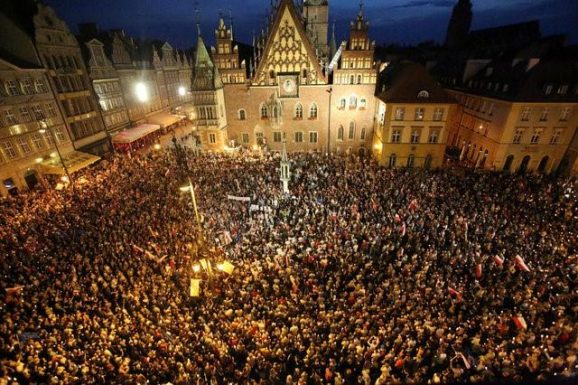Over the last four days, thousands of women have stormed the streets of Poland, protesting a recent court ruling that drastically restricts their right to access safe and legal abortions.
Carrying banners and placards — many bearing a red lightning bolt, a symbol of the pro-choice protests in the country — the demonstrators demand the reversal of the ruling by Poland’s highest court.
On Friday, riot police violently cracked down on protestors after they gathered near the home of the ruling Law and Justice Party leader Jaroslaw Kaczynski, who is widely considered to be the country’s de facto decision maker.
Clashes broke out when law enforcement authorities began to use pepper spray to disperse crowds of more than a hundred protestors in Warsaw. So far, at least 15 demonstrators have been arrested, of whom 14 have been released, CNN reported.
Human rights activists and groups across the world, including Amnesty International, have widely condemned the Polish court’s ruling, calling it an attack on women’s basic human rights.
What was the Polish court’s recent ruling on abortions?
On Thursday, Poland’s Constitutional Tribunal ruled that an existing law allowing abortions of malformed foetuses was unconstitutional, immediately provoking an outcry from women and pro-choice activists across the country.
In the ruling, the tribunal’s president Julia Przylebska said that permitting abortions in the case of foetal deformities legalised “eugenic practices with regard to an unborn child, thus denying it the respect and protection of human dignity,” The New York Times reported.
Since the Polish constitution assures a right to life, Przylebska argued that an abortion based on a foetal malfunction was “a directly forbidden form of discrimination.”
Last year, MPs from the ruling nationalist Law and Justice party first launched a legal challenge against the country’s 1993 abortion law, which so far permitted the termination of pregnancy on the grounds of foetal defects. Significantly, a majority of the court’s judges were nominated by the ruling party itself.
Poland’s abortion laws were already considered some of the strictest in Europe. Now, once the court’s decision is enacted, abortions will only be permitted in cases of rape, incest, or if there is a threat to the mother’s life.
Undeterred by the recent crackdown by riot police, demonstrators have said they will continue to stage protests across the country until the ban is revoked.
What does the court’s decision mean for the people of Poland?
Fewer than 2,000 legal abortions are carried out in Poland each year, a majority of which are due to foetal defects, a BBC report stated. Abortions in cases of rape, incest or where there is a threat to the mother’s life account for merely 2 per cent of all legal terminations. So the court’s ruling essentially translates to a near complete ban on abortions in the country.
Women’s rights groups have said that an estimated 80,000 to 120,000 Polish women either go abroad or seek illegal abortions every year due to the country’s strict abortion laws. They fear that the number could surge even further if terminations due to malformed foetuses are outlawed.
Despite Poland being one of the most staunchly Catholic countries in Europe, a number of opinion polls have shown that a majority of its citizenry has been against a more restrictive abortion law over the years.
Don’t miss from Explained | Do mouthwashes, nasal rinses really protect against human coronaviruses?
Is this the first pro-choice protest the country has witnessed?
No, this is not the first time people in Poland have protested the country’s abortion laws. In 2016, thousands of women went on strike in protest against a proposal for a complete ban on abortions. They all dressed in black to signify that they were mourning the death of their reproductive rights.
In demonstrations inspired by a similar strike in Iceland in 1975, women across the country opted out of working, attending school and even doing domestic chores and instead participated in pro-choice marches on what was widely called “Black Monday”.
If the draft law was to be enacted, women who were found to have had abortions could have faced a jail term of up to five years. Doctors who carried out or assisted in abortions would also be liable for jail time.
The draft law was proposed by an anti-abortion citizens’ group and was initially supported by the Catholic Church. However, the Church later backed out when bishops said they could not support the proposal to jail women who underwent an abortion.
What has the response been like to the court’s ruling?
Critics of the decision have accused the court of pandering to the ruling regime. A New York Times report points out that 11 out of 12 of the judges were appointed by the ruling party, and the president, Przylebska, is a longtime friend of the party’s leader Jaroslaw Kaczynski.
“The decision of the constitutional tribunal means freezing the issue for years, accepting that life and dignity of women are less important than life of a foetus,” opposition lawmaker Barbara Nowacka, who wrote a letter appealing to the tribunal’s president, told The New York Times.
The Council of Europe immediately condemned the abortion ruling. Its commissioner for human rights Dunja Mijatovic called it “a sad day for #WomensRights”.
Renowned international organisations like Amnesty International and the Center for Reproductive Rights and Human Rights Watch have also criticised the ruling. “The proceedings take place in the context of repeated government attacks on women’s rights and efforts to roll back reproductive rights, as well as legal and policy changes that have undermined the independence of the judiciary and rule of law in Poland,” they said in a joint statement.
Meanwhile, the country’s president Andrzej Duda, who recently tested positive for Covid-19, welcomed the court’s decision. In an interview with the Polish Press agency, his spokesperson said, “We are expressing our satisfaction that the tribunal stood on the side of life.”




